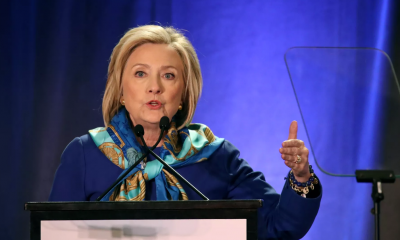World
Hillary Clinton’s emails to be made public in January 2016

Washington: The US Department of State has proposed to the US District Court in Washington to make public official emails Hillary Clinton exchanged on a private server while engaged as secretary of state, Politico newspaper reported.
Vice News had filed a lawsuit under the Freedom of Information Act seeking the release of the emails.
By the time they are released, more than a year will have passed since the former diplomatic chief handed them over to the government.
The 55,000 pages of emails from Clinton’s 2009-2012 tenure were handed over to the department after controversy arose surrounding her use of a personal email address and a private server for communications during that period.
The department plans to release them on January 15, 2016, weeks before the Democratic Party presidential primaries in Iowa on February 1.
“The department understands the considerable public’s (sic) interest in these records and is endeavouring to complete the review and production of them as expeditiously as possible,” John Hackett, the State Department’s acting director of information programmes and services, told the court, reported Politico on Monday.
“The collection is, however, voluminous and due to the breadth of topics, the nature of the communications and the interests of several agencies, presents several challenges,” he added.
Clinton, a favourite to become the Democratic candidate in the 2016 presidential election, acknowledged in March that using her official email address would have been a more “intelligent” thing to do.
She said no official mail, only personal emails and messages, were deleted from the material handed over.
World
Lockdowns in China Force Urban Communities to Defy Censorship and Vent Frustration Online

Shanghai’s rich middle class is leading a wave of online dissent over the strict and prolonged lockdowns imposed in various parts of the country. Chinese internet censorship is struggling as patience is wearing thin in many urban centers, coming up with creative forms of online protests.
Social Media Posts Revealing Lockdown Tension in Shanghai
Drawn-out lockdowns are nothing new in China as authorities insist with the nation’s zero-Covid policy since the start of the pandemic. Currently over This time around, however, metropolitan areas like Shanghai are increasingly difficult to keep quiet, given that its more than 25 million residents have seen weeks of total isolation along with food shortages and many other service interruptions.
Dozens of towns and reportedly over 300 million Chinese citizens have been affected by lockdowns of different severity. As expected, urban netizens have been most outspoken over their difficulties by finding creative ways to get around state censorship and bans placed on topics, news comments and spontaneous campaigns.
Shanghai residents have been using mobile proxies and hijacking seemingly unrelated hashtags to talk about healthcare issues, delivery failures and the overall severity of their situation. The “positive energy” that the Chinese government wants to transmit during the recent prolonged series of lockdowns does not come naturally to those counting food supplies and online censors are working hard to filter words, trending topics and undesired social media sharing.
WeChat groups and message threads are under constant monitoring. Posts questioning the zero-Covid approach have been quickly deleted, including by leading Chinese health experts like Dr. Zhong Nanshan. Video footage is soon censored and protests and investigations are quickly made to disappear.
Where this has not worked, officials have exposed banners with warnings and outright threats like “watch your own mouth or face punishment”, while drones have been patrolling the city skies. Yet, if anything, this has led to further tensions and unspoken confrontation with Shanghai’s educated and affluent middle class.
Creative Online Solutions Harnessing Civic Energy
Announcements by Chinese social media that they would be publishing the IP addresses of users who “spread rumors” have not helped either. Tech industry research has shown that much of Asia’s tech-savvy population has a habit of using mobile proxies and other privacy tools, quickly finding workarounds to browse the internet freely and talk to the world about the hottest topics.
The sheer volume of forbidden posts is already a challenge for the very censorship system, experts explain. Unable to track all trending hashtags, state workers overlook topics that speak about the US, Ukraine or other popular news. Linking human rights elsewhere to their situation, Chinese online dissidents establish their informal channels and “hijack” the conversation to share personal or publicly relevant information about the Covid suppression in their town.
Sarcastic and satirical posts still dominate. Others hope to evade the censors by replacing words from famous poems or the national anthem. One thing is certain – social media, when harnessed with the right creativity, has proven its ability to mount pressure on the government in even some of the most strictly controlled tech environments like China.























